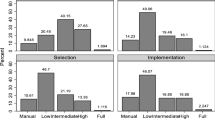Abstract
Legislators sometimes pass unrelated issues in one bill with one vote (omnibus bills), but they often vote separately on different issues as well. In this article, a model is considered in which the first mover chooses whether to bargain over an omnibus bill or several separate bills. The main difference between the two types of bills is that trade-offs between issues are possible with omnibus bills, but not with separate bills. The underlying bargaining game is demand-bargaining (Morelli 1999). In this game, moderate legislators prefer to propose single-issue bills; extreme legislators prefer omnibus bills, if the asymmetry in policy ideal points in the legislature is large enough.
Similar content being viewed by others
References
Banks JS, Duggan J (2000) A bargaining model of collective choice. Am Polit Sci Rev 94(1): 73–88
Banks JS, Duggan J (2006) A general bargaining model of legislative policy-making. Q J Polit Sci 1: 49–85
Baron DP, Ferejohn JA (1989) Bargaining in legislatures. Am Polit Sci Rev 83(4): 1181–1206
Battaglini M, Coate S (2007) Inefficiencies in legislative policy-making: a dynamic analysis. Am Econ Rev 97(1): 118–149
Battaglini M, Coate S (2008) A dynamic theory of public spending, taxation, and debt. Am Econ Rev 98(1): 201–236
Bennett E, vanDamme E (1991) Demand commitment bargaining, the case of apex games. In: Selten R (eds) Game equilibrium models III, strategic bargaining. Springer Verlag, Berlin
Bernheim BD, Rangel A, Rayo L (2006) The power of the last word in legislative policy making. Econometrica 74(5): 1161–1190
Diermeier D, Eraslan H, Merlo A (2003) A structural model of government formation. Econometrica 71(1): 27–70
Diermeier D, Swaab RI, Medvec VH, Kern MC (2008) The micro-dynamics of coalition formation. Polit Res Q 61(3): 484–501
Ferejohn J (1986) Logrolling in an institutional context: a case study of food stamp legislation. In: Wright GC, Rieselbach LN, Dodd LC (eds) Congress and policy change. Agathon Press, Inc., New York
Frechette G, Kagel JH, Morelli M (2005a) Behavioral identification in coalitional bargaining: an experimental analysis of demand bargaining and alternating offers. Econometrica 73(6): 1893–1938
Frechette G, Kagel JH, Morelli M (2005b) Nominal bargaining power, selection protocol, and discounting in legislative bargaining. J Public Econ 89(8): 1497–1517
Heifetz A, Ponsati C (2007) All in good time. Int J Game Theory 35: 521–538
Horstmann IJ, Markusen JR, Robles J (2005) Issue linking in trade negotiations: Ricardo revisited or no pain no gain. Rev Int Econ 13(2): 185–204
In Y, Serrano R (2003) Agenda restrictions in multi-issue bargaining (ii): unrestricted agendas. Econ Lett 79: 325–331
In Y, Serrano R (2004) Agenda restrictions in multi-issue bargaining. J Econ Behav Organ 53: 385–399
Inderst R (2000) Multi-issue bargaining with endogenous agenda. Games Econ Behav 30: 64–82
Jackson MO, Moselle B (2002) Coalition and party formation in a legislative voting game. J Econ Theory 103: 49–87
Kalandrakis T (2006) Proposal rights and political power. Am J Polit Sci 50(2): 441–448
Lang K, Rosenthal RW (2001) Bargaining piecemeal or all at once?. Econ J 111: 526–540
Leblanc W, Snyder JM, Tripathi M (2000) Majority-rule bargaining and the under-provision of public investment goods. J Public Econ 75: 21–47
Montero M, Vidal-Puga JJ (2007) Demand commitment in legislative bargaining. Am Polit Sci Rev 101(4): 847–850
Morelli M (1999) Demand competition and policy compromise in legislative bargaining. Am Polit Sci Rev 93(4): 809–820
Morelli M (2007) Demand commitment and legislative bargaining: a response. Am Polit Sci Rev 101(4): 851
Oleszek WJ (2007) Congressional procedures and the policy process. CQ Press, Washington, DC
Rubinstein A (1982) Perfect equilibrium in a bargaining model. Econometrica 50: 97–109
Snyder JM, Ting MM, Ansolabehere S (2005) Legislative bargaining under weighted voting. Am Econ Rev 95(4): 981–1004




